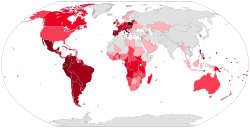| Catholic Church in Austria | |
|---|---|
| Austrian German: Katholische Kirche in Österreich | |
 | |
| Type | National polity |
| Classification | Catholic |
| Orientation | Latin |
| Polity | Episcopal |
| Governance | Episcopal Conference of Austria |
| Pope | Leo XIV |
| Chairman | Franz Lackner |
| Primas Germaniae | Franz Lackner |
| Apostolic Nuncio | Pedro López Quintana |
| Region | Austria |
| Language | German, Latin |
| Headquarters | Vienna, Austria |
| Members | 4,557,471 (49.6 %) (2024) |
| Official website | Episcopal Conference of Austria |
| Part of a series on the |
| Catholic Church by country |
|---|
 |
| |

The Catholic Church in Austria is part of the worldwide Catholic Church in full communion with the Pope in Rome. The Church's governing body in Austria is the Austrian Conference of Catholic Bishops, made up of the hierarchy of the two archbishops (Vienna and Salzburg), the bishops and the abbot of territorial abbey of Wettingen-Mehrerau. Nevertheless, each bishop is independent in his own diocese, answerable only to the Pope. The current president of the Conference of Catholic Bishops is Cardinal Christoph Schönborn. The Austrian church is the largest Christian Confession of Austria, with 4.56 million members (49.6 % of the total Austrian population) in 2024. [1]
Contents
- Organisation
- Ecclesiastical structure
- List of Catholic organisations in Austria
- Statistics
- Criticism
- Call to Disobedience organization
- Notable people
- See also
- References
- External links
For more than 50 years, however, the proportion of Catholics has decreased, primarily due to secularization and migration (from 89% in 1961 to under 50% in 2024). The number of Sunday churchgoers in 2023 was around 4.1 percent (as percentage of the total Austrian population that is 378,797 churchgoers out of a total population of 9,158,750).
Although Austria has no primate, the archbishop of Salzburg is titled Primus Germaniae (Primate of Germany).


